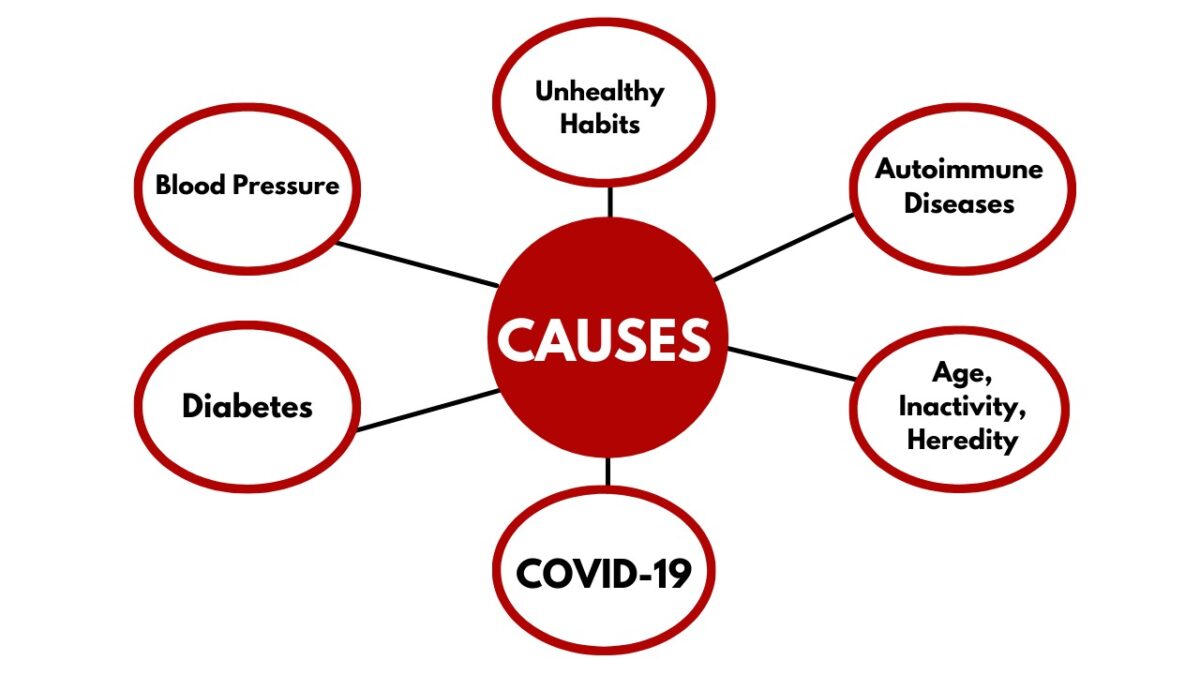Causes, Symptoms, and Prevention of Heart Attack

Written by Aryan Pratyush Nayak and Deepak Kumar Nayak
About Heart Attack
A heart attack or myocardial infarction refers to a condition when an artery supplying blood and oxygen to the heart becomes blocked.
For a country that sees 2.8 million deaths from cardiovascular diseases every year, a heart attack is not unheard of. What’s particularly concerning is the fact that this number has risen from 1.3 million to 2.8 million in just 26 years.
Many people believe that they don’t need to worry much about heart health in the early part of their life but research shows that cardiovascular diseases can begin in people as early as childhood, meaning that a ratio of teenagers is currently fighting with cardio-vascular complications without their knowledge. So in a country whose citizens have very limited medical knowledge, heart diseases are a real threat.
Causes And Risk Factors Of Heart Attack
Heart attacks generally occur when there is a narrowing or blockage of the blood vessels (coronary arteries) that carry oxygenated blood to the heart. This condition is called Coronary heart disease (CHD).
Coronary heart disease is a result of “atherosclerosis” which is usually caused by an accumulation of fatty deposits including cholesterol and plaque inside the coronary arteries.
Apart from this, there are several other health conditions and inappropriate lifestyle habits that can increase the risk of encountering a heart attack :
-
Blood Pressure/ High triglycerides levels
Health conditions like high blood pressure and high triglycerides levels caused due to obesity can damage your arteries leading to your heart and increase the risk.
-
Diabetes
Individuals with diabetes who cannot produce enough insulin or doesn’t respond to insulin properly can cause their blood sugar levels to rise, increasing the risk of a heart attack.
-
Autoimmune diseases
Moreover, having a condition such as rheumatoid arthritis or lupus can increase the risk of a heart attack.
-
Unhealthy habits
Inappropriate lifestyle habits like intake of tobacco, drinking alcohol, smoking cigarettes and illicit use of drugs can trigger increased heart rate, tightens major arteries, and affect the heart rhythm, which increases pressure on your heart and increases the risk of stroke.
-
Age, Inactivity or heredity
Also if you’re aged, physically inactive, stressed or any of your family members are associated with heart attacks, then you might be at increased risk.
-
COVID-19
Scientific studies also stated that infection due to COVID-19 may also damage your heart in various ways thereby increasing the risk of a heart attack.
Many of these risk factors can be eliminated to reduce your chances of having a first or further heart attack.
Early Signs Of Heart Attack
- Symptoms of a heart attack include tightness or pain in the chest, neck, back, or arms, fatigue, lightheartedness, sweating, abnormal heartbeat, and anxiety.
- It is accompanied by gastrointestinal problems include heartburn, indigestion, nausea, or vomiting.
- Discomfort in the arms and neck are also common.
- The earliest warning of heart attack might be recurrent chest pain or pressure (angina) that occurs while performing physical activity and gets relieved by rest. The level of discomfort may vary from severe to mild and also in some cases heart attacks are asymptomatic and strikes suddenly.
However, these symptoms are not common for all and vary from person to person or on a gender basis. Women are more likely to have atypical symptoms than men.
Prevention Is The Key
While many have taken up with a life of continuous medicines as a support for a healthy heart, what it really takes is just to get a few steps straightened up.
-
Smoking does really kill
Smoking has a devastating effect on heart health and is one of the foremost reasons behind heart stroke. We know that quitting to smoke is tough but it’s definitely way easier than to survive a heart attack.
-
A healthy nutrition
A healthy diet is an extreme necessity to fight cardiovascular diseases. Our food not only provides us with essential nutrients but also is a driving factor behind many controllable risk factors like blood pressure, cholesterol levels, diabetes, and over-weight. Hence it is essential that food habits are given proper attention. Make sure to eat food that is rich in nutrients but is low on calories. Include vegetables, fruits, nuts, low-fat dairy products, and whole grains in your diet, and try to limit the intake of sweets, sugar-sweetened beverages, and red meat.
-
Keep an eye on your cholesterol level
Fat accumulated in arteries is a disaster waiting for you, which could trigger a heart attack or a stroke at any point of time hence it is very essential to have a healthy cholesterol level. On the whole, the total cholesterol score should be kept within 125-200mg/dl for both men and women. People below the age of 20 are preferred to keep it within 170.
-
Lower high blood pressure
Higher blood pressure among younger people is a clear indication of fat deposition in arteries and is a major risk factor for a stroke. An optimal blood pressure reading is less 120/80 mmHg, so try to keep it within that.
-
Quit being a couch potato
Many people live with the belief that any form of physical stress is a threat to the heart. While it may be true on some part but the larger part of it states that some form of physical activity is extremely essential for a healthy heart. So start including yoga and exercise in your daily routine. Try to wake up early and do Surya-namaskar or jog for about one kilometer every morning to keep all your risk factors in check.
-
Relax for a bit to live longer
Excessive stress increases the chances of coronary heart disease and may also affect other risk factors as well. For example, a person under stress may not give attention to a proper diet and physical activity which in turn could result in undesired cholesterol and blood pressure levels. Hence it’s necessary that you don’t take too much stress on yourself.
-
Don’t drink yourself to death
Higher consumption of alcohol results in higher levels of triglycerides can increase blood pressure and can contribute to obesity and other diseases. Hence if you are a drinker then try to limit the amount of alcohol that you take.
Conclusion
By the time you have come across this blog, there would be about 70 people who would have died of a heart attack in India. Now that is a scary number which is why it is very essential that we adapt to a proper lifestyle that bears the fruit of long life. If we don’t stop the horrendous abuse of lifestyle then we would probably end up with mass sickness that would last for ages to come.








